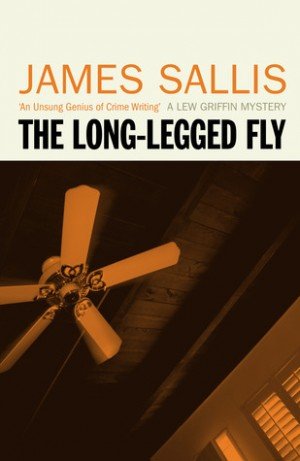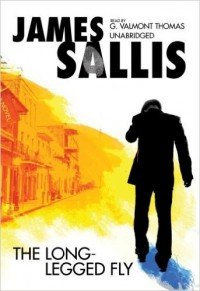
This spartan but stylish New Orleans noir was James Sallis’s debut novel and the first book in his Lew Griffin series. The Long-Legged Fly introduces us to the grizzled private detective through an exchange that’s the epitome of crime noir – beautiful and brutal in equal measure – however as the novel unfolds, there’s more to Lew Griffin’s character and James Sallis’s writing than just liquor and style, there’s real heart and humanity too.
The Long-Legged Fly spans several decades and is less a single detective story, and more four stories about a single detective. Not dissimilar to Raymond Chandler’s Farewell My Lovely – which was originally three separate short stories – Sallis tells us four different tales as Lew looks for missing persons. There’s political activist Corene Davis in 1964, run-away teenager Cordelia Crayson in 1970, his friend’s kid sister in 1984 and his own, distant son David in 1990. Although there may be plot holes, these gaps allow for glimpses into Lew’s personal life; his loves, his limited family, and his self-sabotage. He’s a tragic character, at peace with himself but fighting to understand the world around him.
Although the typical hallmarks of a private eye are all here – heavy drinking, missing persons, world-weary outlooks – Sallis avoids the stereotypes by depicting his black protagonist with a detailed sensitivity – in both the character’s shortcomings and the problems plaguing the community around him. Sallis has a deep understanding of the post-war New Orleans that provides our backdrop, as well as an obvious love of the culture, issues and the location – the underbelly of the French Quarter with its pimps, prostitutes, and flavoursome food. It’s impressive how much atmosphere and scene-setting Sallis can convey with so few words, and here his stripped back prose echoes the starkness of James M Cain, and the calculation of Cormac McCarthy, so there’s never a wasted word. The fact that Sallis has been a New Orleans resident for many years, shines through, and in Lew Griffin, the author paints a poetic picture of a flawed protagonist who’s as lost as the missing persons he’s trying to find, more so perhaps, because who’s looking for him?
The Long-Legged Fly isn’t densely plotted, but the quietly powerful prose builds around you, immersing you in a murky world full of everyday strife, black struggle and glimpses of hope. It’s rich with heritage, feeling, and a sense of place. James Sallis can create mood like no one else, the blues influence is obvious here not just name checking legends to augment Lew’s character, but in the lyrical turns of phrase that are as charming as they are haunting, and frequently lift the story off the page. Comparisons with James Lee Burke and Raymond Chandler ring true but it is Sallis’s distinctive yet withheld voice that singles him out. His writing style is tough yet tender, evident in secondary characters like English nurse Vicky, who steadies Lew with some much needed grounding and TLC, and LaVerne, his accommodating and ever enduring close friend.

The theme of relationships ties the four tales together, whether overtly or through subtle, humming under currents. In the first story Lew fails to visit his father on his death bed in order to look for the missing black leader, Corene Davis. Sallis is too nimble to out-right say, but we get a clear sense that it’s not for a love of the job (although commitment does drive him), it’s to distract from the problems closer to home – the pain of losing his father – something much harder to deal with for our detached but empathetic hero. The deft last story, where Lew – now a successful crime novelist – must find his missing son, is both wry and emotional, a difficult concoction James Sallis achieves with a sophisticated finesse.
The resulting portrait of private eye Lew Griffin is cooly existential, as gritty and culturally relevant as The Wire, with a similar sense of ground-level realism, and this first instalment sets up a character with enough interesting issues and intriguing traits to hook readers like bait. This was not only Sallis’s first novel, but the genesis of his Lew Griffin series, now comprised of half a dozen books – all of them stone cold crime classics. And this isn’t just down to the author’s enchanting prose, but his crafting of a complex lead man, complete with both wit and faults. Lew Griffin is more complicated than Philip Marlowe and more human than Sam Spade. It’s not hard to imagine that James Sallis fans come for the style and atmosphere but stay for the character of Lew Griffin, his weaknesses and his compassion, the sort of guy you both look up to, and see yourself in.
In 1992, when it was first published, The Long-Legged Fly announced the arrival of a major talent in crime fiction, and James Sallis has continued to deliver his enthralling take on hardboiled noir ever since.
If you like the sound of this, you could also try Galveston by Nic Pizzolatto or The Killer is Dying, also by James Sallis.












